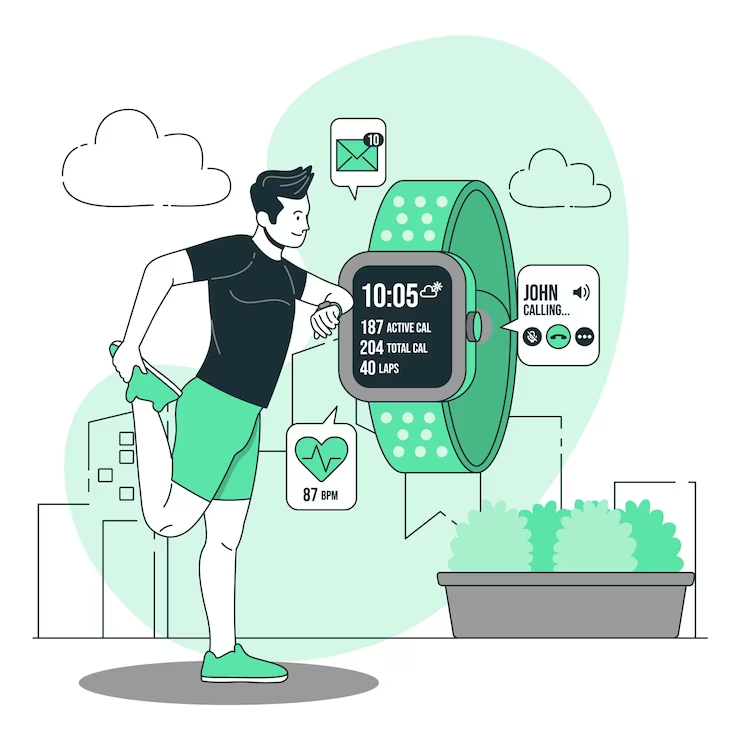Maximizing Exercise Performance: The Role of Nutrition and Fueling Strategies

Sport illustrations by Storyset
What should I eat before my workout? How do I know if I am eating enough protein for muscle growth and recovery? What types of food enhance endurance and speed?
These are some of the problems people have when it comes to food and exercise performance. While it is more common to fixate on the training program, when you get engaged in the workout program, you find that your results start to become food-dependent.
All of my one-repetition maximums have increased since I started focusing more on my diet and eating well during the day. Just like you wouldn't expect a car to take you anywhere without fuel, you can't expect your body to perform optimally without the much-needed nutrients.
If this is a topic that interests you and you would like to know how to stay on top of your game whether you are running, jogging, lifting, playing football, or basketball, then you are going to want to read the rest of this.
Nutrition and Fitness

Sport illustrations by Storyset
It is already well-known and documented the effects good food can have on exercise performance. Old and new research keeps finding that carbohydrates before and during exercise have a significant effect on performance.
When the body has readily available fuel, it delays fatigue and can allow athletes to sustain higher intensities for longer durations.
My one-rep max on the inclined bench press was 60kg when I started working out. I used to work out in a fasted state, and I would push myself as much as I could. Now my warm-up sets are 50kg. In a matter of a few months, I will be warming up with what used to be my maximum.
Requirements

Sport illustrations by Storyset
If you are going to be the best you can be at the gym, then it is going to require you to meet daily requirements for the best performance, recovery, and overall health. To make the most of your diet, here are some tips:
If you train daily or you are an athlete, then odds are, you will need more energy than the typical person out there. You need to have a balanced diet that includes carbohydrates, proteins, and healthy fats. Despite the criticism carbohydrates receive, they still need to be the majority of your diet so that you can have glucose in the blood and replenish glycogen stores.
Proteins are vital for muscle repair and growth, and healthy fats provide energy and support hormone production like testosterone and estrogen, which help with proper secondary sexual characteristics.
Use whole foods as opposed to supplements. I always say that supplements are trying to be like whole foods. Use whole grains, bread, and cereals such as brown rice and whole wheat pasta, which provide complex carbohydrates and fiber.
Leafy green vegetables have a lot of vitamins, minerals, and antioxidants. Fruits supply additional vitamins and natural sugars that can give you the energy you need for your workout.
Lean meats, such as poultry and fish, are wonderful sources of high-quality proteins.
Drinking water is also very underrated. I think of all the times that I could have made massive gains, but I was not hydrated enough because I was neglecting water intake. Drink as much as you want while working out. Don't hold back if you feel thirsty. Our muscles are 75% water, and if you want to do anything good for them, it will include a little bit of water.
While working out, you need to have a good relationship with food, lest you develop an eating disorder. There are several eating disorders that stem from unhealthy eating habits due to the desire to maintain an unhealthy body fat percentage.
There is nothing wrong with having a double-digit body fat percentage as long as you are within the normal BMI range for individuals.
Conclusion
In conclusion, the importance of good nutrition in exercise performance cannot be overstated. The food we consume plays a vital role in fueling our workouts, supporting muscle growth and repair, enhancing endurance and speed, and promoting overall health and well-being.
To optimize exercise performance, it is crucial to meet daily training diet requirements. This includes providing sufficient energy and nutrients to meet the demands of training, incorporating a wide variety of whole foods such as whole grains, vegetables, fruits, lean meats, and low-fat dairy products, and ensuring adequate hydration before, during, and after exercise.
By focusing on whole foods instead of relying heavily on supplements, we can harness the natural power of nutrients found in foods like whole grains, leafy green vegetables, fruits, and lean meats. These foods provide complex carbohydrates, fiber, vitamins, minerals, antioxidants, and high-quality proteins necessary for optimal performance and recovery.
Hydration should never be underestimated, as staying properly hydrated is crucial for maintaining energy levels and preventing fatigue during exercise. Drinking water is essential, and athletes should listen to their bodies and drink as needed to quench thirst and support optimal muscle function.
Developing a healthy relationship with food is equally important. Striving for a balanced approach to eating and avoiding restrictive diets can help prevent eating disorders and ensure long-term sustainability in maintaining a healthy body fat percentage within the normal BMI range.
In summary, the combination of proper nutrition and exercise is the winning formula for achieving peak performance. By understanding and meeting our body's nutritional requirements, fueling ourselves with wholesome foods, and staying adequately hydrated, we can unlock our full potential in the gym and achieve our fitness goals while promoting our overall health and well-being. So, let's nourish our bodies, train smart, and reap the rewards of a well-fueled and high-performing lifestyle.
Have you ever experienced the impact of nutrition on your exercise performance? What are some of the challenges you face in maintaining a balanced diet while trying to optimize your workouts?
Do you have any go-to pre-workout meals or snacks that you find help you perform better? How do you ensure you're consuming enough protein for muscle growth and recovery?
Have you noticed any differences in your endurance or speed when incorporating specific types of foods into your training diet?

Thanks for your contribution to the STEMsocial community. Feel free to join us on discord to get to know the rest of us!
Please consider delegating to the @stemsocial account (85% of the curation rewards are returned).
You may also include @stemsocial as a beneficiary of the rewards of this post to get a stronger support.